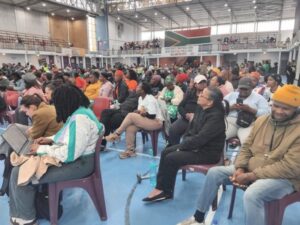
The Minister of Public Works and Infrastructure, Dean McPherson has revealed that construction mafia are no longer the main reason for delays in construction projects around the country. Budget and supply chain management issues are rather at fault. McPherson told the media that since the Construction Summit in Durban last year, collaboration between public works, the police and provincial governments, and the introduction of the department’s own hotline for tip-offs, has paid off.
“We have made remarkable progress in keeping our sites safer. In a year we have seen more than 850 people arrested. We have seen more than 240 convictions which is a new number and in some instances, according to the industry, we have seen an 80% decline in lost construction hours. But, of course it remains on our radar,” he said.
The minister was briefing the media in parliament on Wednesday, announcing the South African Construction Action Plan to deal with delayed construction projects and to restore accountability in the sector and confidence in government’s ability to deliver.

Accompanied by the director-general of the Department of Public Works and Infrastructure, Sifiso Mdakane, and the deputy director-general: construction project management, Batho Mokhothu, McPherson said that the days are numbered for underperforming contractors. “From today, those who cannot or will not deliver will be held accountable, whether they are contractors, consultants, or officials. The plan we are unveiling today is built on 6 key actions that address the root causes of underperformance and put in place the systems and standards we need to restore delivery,” he said.
These 6 action points include accountability and blacklisting of contractors who default, fixing of cash-flow constraints by ring-fencing project budgets, digital tracking of projects to ensure monitoring and evaluation, introduction of war rooms made up of different professionals to prevent delays, synergy of national and provincial government with the auditor general to address audit findings in real time, and professionalising the built environment in the public sector so as to reduce outsourcing of skills.
On the issue of budget ring-fencing, Batho Mokhothu said they are engaging the national and provincial treasury departments to ensure that projects are delivered on time. “There are examples whereby the provinces are reporting that a project would be at 80% of completion but treasury could not realise the funds for that particular year and the contractor would have to stand down until funds are available. We cannot allow that,” he said.

According to the plan, contractors who fail the state will not be given a second chance to waste public funds. “For too long, underperforming contractors have operated with impunity. They fail on one site, only to resurface in another province under a new name or company number. That will come to an end,” said the minister.
“Every public works department will now launch a procurement war room, a hub that brings together supply chain specialists, legal advisors, engineers, and project managers to monitor awards in real time. These war rooms will identify blockages, speed up evaluations, and ensure that projects move from bid to site without unnecessary delay,” he said.
“By June 2026, all built environment professionals working for, or contracted by, public works departments will be required to be registered with their statutory councils, such as the Engineering Council of South Africa or the South African Council for the Project and Construction Management Professions. This will not only raise professional standards but also reduce our over-reliance on external consultants, ensuring that the skills to build the country reside inside the state, not outside of it,” the minister said.
Part of the plan is to strengthen project managers across a sector lacking in skills, experience and numbers. “We need to strengthen our project managers across the sector because we have a challenge of the quality of project managers that we have. Also the project manager to project ratio is not just about numbers, we will have to look at individuals. For instance, a project that is meant to build a hospital is complex and the manager must still oversee other projects. What you find on average is one project manager for between 5 and15 projects, which makes it difficult to manage and control projects,” Sifiso Mdakane, said.
There is currently R14-billion in construction projects being designed, planned and constructed across all national and provincial public works and infrastructure departments.





